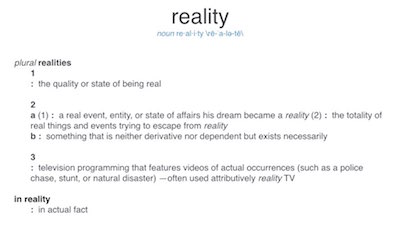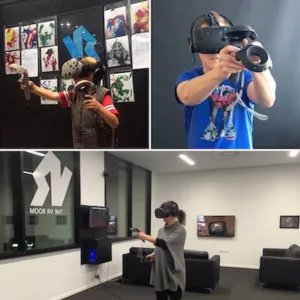One of the latest discoveries of our society is that ‘Fake News’ can be as powerful as reality. This does not mean that fake news is a new concept one could argue that the invention of any kind of communication was the start of fake news. In former times we just called them lies, the question remains of whether there is a difference between lies and fake news. The big difference today is the almost instantaneous distribution of any news via social media, regardless of the truth or possible consequences. The only required ingredients are a person willing to create fake news and the people who are interested in reading them.

So what has virtual reality to do with this? For beginners, the two things seem to describe the same thing, something that is not real based on the definition of reality. Just check out what Merriam Webster has to say about reality.
 Definition of Reality by Merriam Webster
Definition of Reality by Merriam Webster
As you can see the whole ‘reality thing’ has something to do with being real, meaning basically the opposite of ‘virtual reality’. In other words, virtual reality is fake news to begin with. So, as virtual reality becomes more of a reality in our media-centric world, the pure existence of virtual reality is real news. Okay, let’s look at it in a different way – before my head blows up!
The term reality has been a topic for philosophical discussion going back thousand of years. There are different states of reality that philosophers use to explain how facts will be seen by different people in different ways. One way to understand this is to listen to eye witnesses describing the same event. Most likely they won’t agree on all details, leaving it up to the listener to draw his own conclusions. So whatever reality is, it seems to be in the eye of the beholder.
On a different level, most of the movie industry is in the business of creating something that is not real (this applies even to most of the documentaries). On one hand, virtual reality could be viewed as an extension of movie-based entertainment (360º movies, environments, etc.), on the other hand, VR is a new type of social media that could change all of our lives.
So, does VR has anything to do with ‘reality’? One recently discussed study by Jesse Fox from Stanford University,”The embodiment of sexualized virtual selves: The Proteus effect and experiences of self-objectification via avatars” shows that virtual reality has very real consequences for the behavior and beliefs of the user. The study shows that people change their real life positions based on what they experience in VR. On a very simple note, it confirms that the famous Stanford Prison Experiment basically works even when the user only uses VR headsets. It seems that from a psychological perspective human mankind is very easy to influence.
 Facebook VR Room
Facebook VR Room
Taking the recent announcement of Facebook’s Mark Zuckerberg about the beta release of the ‘VR Room’ for the Oculus Rift as a starting point, we seem to be heading towards a society where VR interaction is catching up to real life interaction, with plenty of ways to create awkward situations or even worse. If you need help to imagine where this could lead to, I recommend reading Isaac Asimov’s ‘The Naked Sun’ – part of the robot series – where a society completely based on VR interaction has to deal with a real life murder.
Facebook VR Room in action
While the Asimov book is based on the idea that ‘ultimate VR’ is a lifelike holographic image that makes it impossible to distinguish the VR representation form the real thing, Facebook wants to transform the user into a comic book character that is much easier to handle from a computing standpoint. As we have learned over the last few decades, computing power is only a question of time; if you don’t have enough today, just wait a few years and your smartphone can do it.
Nevertheless, the direction is clear and the last remaining question is whether we are willing to accept a ‘Matrix-like’ life over the real thing. From a more pessimistic view or, as I believe, a more realistic standpoint, the question is more likely “What percentage of human mankind will choose this existence over real life?”. (NH)

